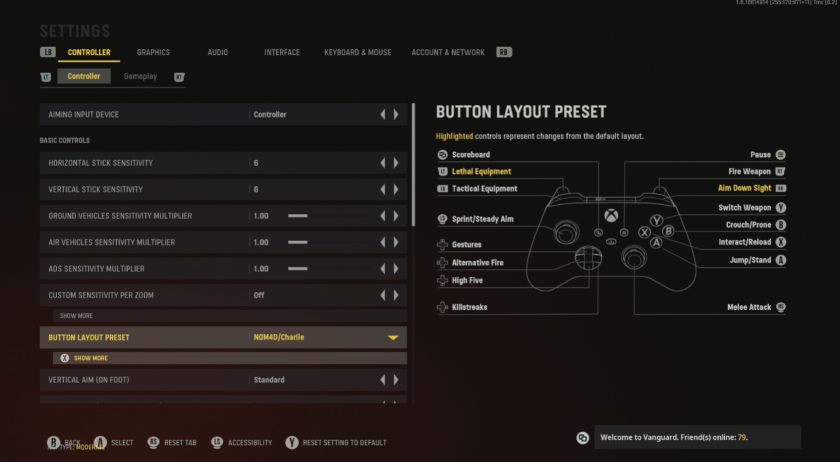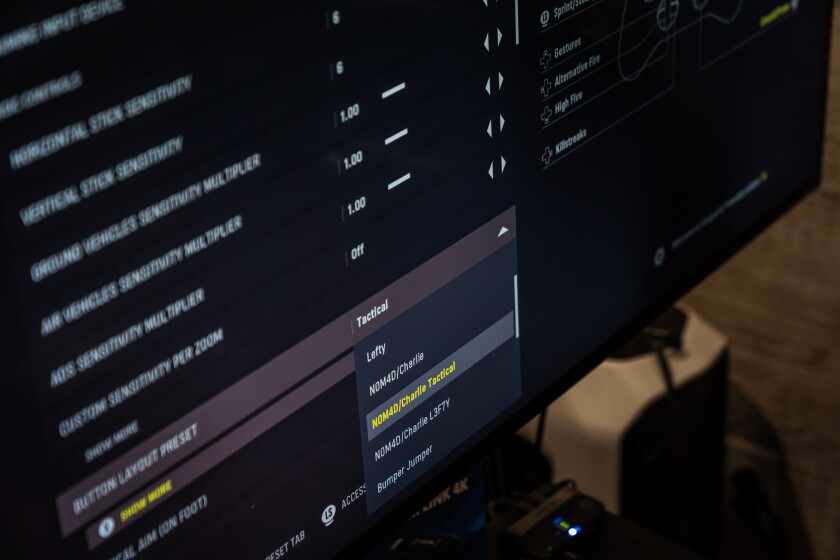ROCHESTER, Minn. ŌĆö A broken promise made 15 years ago was recently mended for Randy Fitzgerald.
Fitzgerald, a former professional video game player now turned Facebook Live streamer in Rochester, helped develop one of the first major accessibility features in a video game for people with disabilities for the 2007 game ŌĆ£Call of Duty 4: Modern Warfare.ŌĆØ While testing the game, his disability, arthrogryposis, which makes him unable to use his legs or arms, made it difficult to use the button layout.
ADVERTISEMENT
Changes were made and the company, Infinity Ward, named the layout after his gamer tag ŌĆ£N0M4D,ŌĆØ but he was never credited by name. Raven Software, the main studio behind the development of ŌĆ£Call of Duty: VanguardŌĆØ that released on Nov. 5 reached out to Fitzgerald with a free copy of the game and recommended he check out the end credits.
ŌĆ£I was really excited ŌĆ” ThatŌĆÖs pretty cool,ŌĆØ Fitzgerald said. ŌĆ£Of all the games IŌĆÖve worked on over the years, this is the first time IŌĆÖve been credited.
ŌĆ£It was validating. I almost wanted to be like ŌĆśFinally!ŌĆÖ But I didn't want to be ungrateful either.ŌĆØ
Fitzgerald first started playing video games when he was a kid growing up in Iowa. When his family took him to a bowling alley, his dad helped him get close to the Pac-man arcade game so Fitzgerald could play with his mouth.
That started a love for video games that only grew in high school.
ADVERTISEMENT
ŌĆ£ThereŌĆÖs that phrase: every man has to have competition. I couldnŌĆÖt play basketball. I couldnŌĆÖt play football,ŌĆØ he said. ŌĆ£Even when I was a little kid, I knew this was going to be the next big sport ŌĆ” It was something I could do that was an even playing field.ŌĆØ
After graduating college with a degree in game design and interning at the video game studio Activision, which has developed several Call of Duty games, Fitzgerald became a well-known figure in the gaming world after attending a video game convention in 2006.
His style of play, which involves using different facial features and muscles to operate the controller, was the first time anyone had seen a video game played in that way.
ŌĆ£I played Sonic with my mouth on the controller, that was the first major media frenzy. I just remember turning around; all these lights were flashing,ŌĆØ Fitzgerald said. ŌĆ£It was like paparazzi. ThatŌĆÖs what it felt like, a celebrity paparazzi and I was just like ŌĆśwhat is going on?ŌĆÖ And next thing I know thereŌĆÖs like 800 microphones in my face.ŌĆØ
How Randy Fitzgerald plays Call of Duty:
ADVERTISEMENT
From that convention onward, Fitzgerald grew a massive following for being the worldŌĆÖs first quadriplegic professional video game player as well as an advocate for creating accessibility features in video games for disabled players like himself.
This following played a key role when he was playing a test version of ŌĆ£Call of Duty 4: Modern WarfareŌĆØ in 2006.
While playing the game, he found it difficult using the available button layouts on his Xbox controller. He left a message on Infinity WardŌĆÖs forum page voicing how he enjoyed the game, but struggled to play it. The response back was overwhelming.
ŌĆ£Twenty-five thousand people replied,ŌĆØ Fitzgerald said. ŌĆ£(Infinity Ward) called me and said ŌĆśWeŌĆÖre going to take your suggestions, put them in the game and name it after you,ŌĆÖ and I was like ŌĆśWow!ŌĆÖŌĆØ
The button layout became one of the first major accessibility features in a video for people with disabilities and was a staple feature in most of the Call of Duty versions that were released in the next 15 years. FitzgeraldŌĆÖs actual name, however, was never credited in the following games after Activision took over Infinity Ward and ousted the development teams that promised Fitzgerald credit.

ADVERTISEMENT
For Fitzgerald, whose livelihood revolves around playing video games, especially Call of Duty, it hurt not receiving the credit.
ŌĆ£I was disappointed they lost contact with me,ŌĆØ he said.
But earlier this year, Raven Software, the lead developer for ŌĆ£Call of Duty: Vanguard,ŌĆØ was wondering who was responsible for the ŌĆ£N0M4DŌĆØ button layout and reached out to Fitzgerald.
ŌĆ£I told them the whole story and they said ŌĆśthatŌĆÖs messed up,ŌĆÖŌĆØ he said. ŌĆ£They asked me what I would like, probably thinking I would ask for money, but I just wanted to be credited. I wanted what was promised to me.ŌĆØ
Fitzgerald had a virtual meeting with the company shortly after about the situation and other accessibility features that could be added into the game. After the meeting, however, he didnŌĆÖt hear anything back from Raven Software for months.
ŌĆ£I was like, ŌĆśHere we go again,ŌĆÖŌĆØ he said.
But the studio did reach out again, and now FitzgeraldŌĆÖs name is officially credited in development, signifying the impact heŌĆÖs felt heŌĆÖs spent his career in the gaming industry trying to make.
ADVERTISEMENT
Fitzgerald hopes this kept promise will open more opportunities for him to continue game development in the years to come.
ŌĆ£It means everything,ŌĆØ he said. ŌĆ£I think everybodyŌĆÖs goal on earth should be to leave a mark and make the world a little bit better, and I feel like I kind of did that.ŌĆØ










